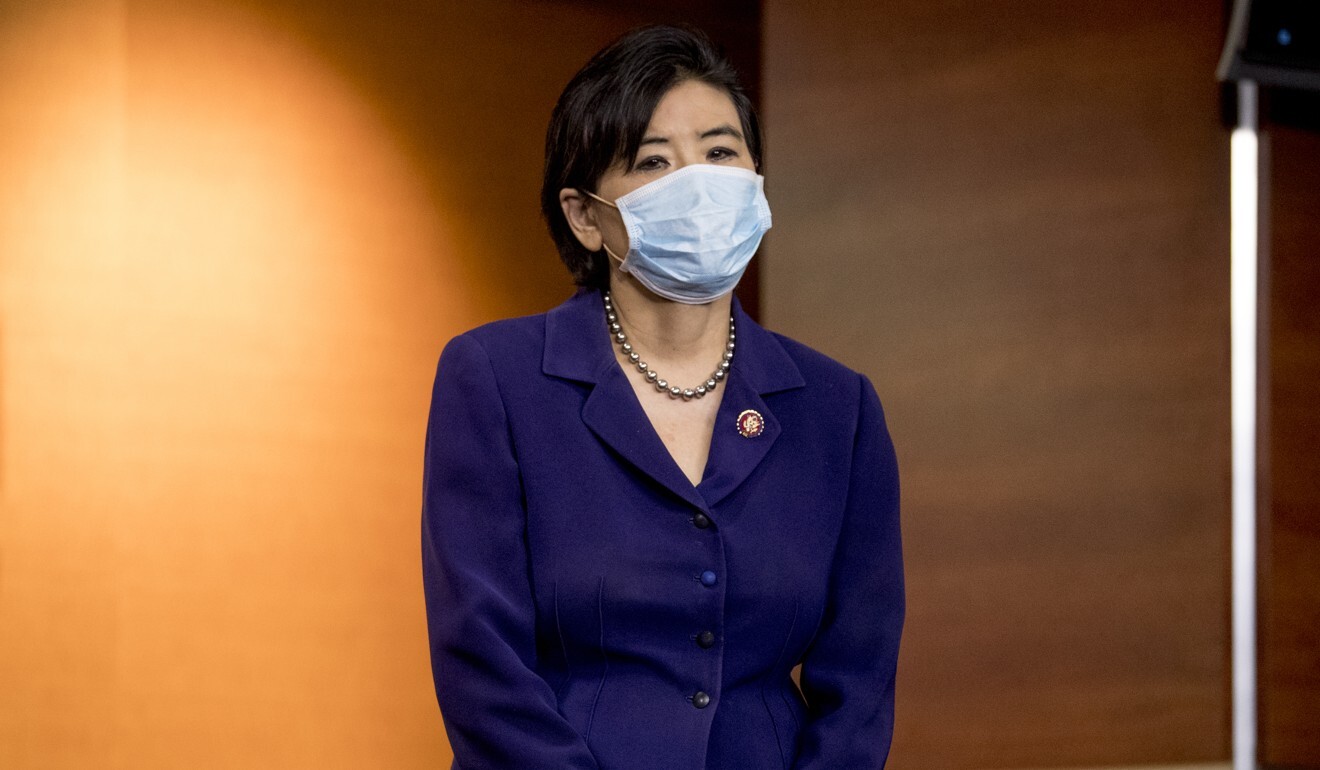
US Congress is told Atlanta shootings were culmination of rising rhetoric and violence against Asian-Americans
- Asian-American congresswomen say the killings ‘are the aftermath of one year of hateful attacks’
- A Texas Republican who objects on free-speech grounds is ‘putting a bull’s-eye on the back of Asian-Americans’, Representative Grace Meng says tearfully
In a hearing that at times turned emotional and confrontational, Asian-American congresswomen told their colleagues on Thursday that the killings Tuesday in Georgia of eight people, six of them Asian women, were a culmination of rising hostility and violence targeting Asian-Americans across the country – fuelled by rhetoric from the nation’s highest office.
The gunman’s “targets were no accident”, said Representative Judy Chu, the California Democrat who leads the Congressional Asian Pacific American Caucus. “And what we know is that this day was coming.”
“The most recent round of anti-Asian attacks are the aftermath of one year of hateful attacks and four years of ugly comments about immigrants and people of colour,” she added, a reference to the presidency of Donald Trump.

The attacks have shaken the nation. Also on Thursday, the White House scrapped plans for US President Joe Biden and Vice-President Kamala Harris to hold a political event in Georgia about the economic recovery. Instead, the two scheduled a meeting on Friday with Asian-American leaders in Atlanta to discuss “the ongoing threats against the community,” the White House said.
Biden also ordered that US flags at the White House and all federal and military buildings be flown at half-staff to honour the victims of Tuesday’s “senseless acts of violence”.
#StopAsianHate trends online as Asian-Americans grieve after shooting
Long was expected to appear in court for his arraignment on Thursday morning, but the proceedings were cancelled without explanation.
Authorities have identified those killed in Tuesday’s first attack as Daoyou Feng, 44; Xiaojie Tan, 49; Delaina Ashley Yaun, 33; and Paul Andre Michels, 54. Police in Atlanta are yet to release the names of those killed in the following two attacks; all four women are thought to be of Korean descent.
Civil rights activists and scholars also spoke at the hearing, urging public figures to reject racialised language when discussing the coronavirus. Those appeals came as some Republican lawmakers sought to frame efforts to counter inciteful language as an infringement on freedom of speech.

02:32
Democratic lawmaker accuses Republican of putting a ‘bull’s-eye’ on the backs of Asian-Americans
In addition to other friction during the US-China trade war, Trump last year maintained that the coronavirus pandemic was China’s fault because the first outbreak occurred in the hub city of Wuhan. Calling the coronavirus the “Chinese virus” and “Kung flu”, the hearing was told, contributed heavily to a hostile environment for Asian-Americans.
Research conducted by Stop AAPI Hate, a coalition of Asian-American advocacy groups, found that between March and August last year, more than 700 of the 2,500 reported incidents of harassment toward Asians included those phrases amid other anti-Chinese rhetoric. the group has accrued almost 3,800 incidents of harassment targeting Asians over the past year, with more than two-thirds of them targeting women.
When Trump had used “racist dog whistles that are clearly interpreted as an effort to blame one community or one government and by implication the community of people who are thought to be associated with it, that affects the entire society,” said Shirin Sinnar, a professor at Stanford University Law School.
In addition to the public health and economic crises brought about by the pandemic, Asian-Americans now “also have to worry about being attacked or harassed in our own neighbourhoods,” said Erika Lee, a professor of history and Asian-American studies at the University of Minnesota.
Asian-American group reports 3,795 racially motivated attacks during pandemic
Representative Chip Roy, a Texas Republican, took issue with what he considered a call to restrict language, countering that “nothing could be more dangerous” than policing free speech.
Roy’s comments drew a sharp rebuke from fellow lawmakers, among them Representative Grace Meng, a Democrat from New York who last year wrote a resolution condemning anti-Asian sentiment relating to the coronavirus. When the measure was approved in September, 164 Republicans voted against it.
“Your president and your party and your colleagues can talk about issues with any other country that you want,” Meng said to Roy, referring to Trump.
“But you don’t have to do it by putting a bull’s-eye on the back of Asian-Americans across this country, on our grandparents, on our kids,” Meng continued, through tears. “This hearing was to address the hurt and pain of our community and to find solutions. And we will not let you take our voice away from us.”

The free speech argument didn’t apply, John Yang, president of the Asian Americans Advancing Justice advocacy group, told lawmakers.
“Free speech is not a defence,” said Yang. “We have no free speech right to yell ‘fire’ in a crowded theatre. And what is happening right now is that Asian-Americans are in a crowded theatre where we are being endangered.”
The White House has joined Democratic lawmakers in drawing a direct line between increased attacks against Asian-Americans and the ethnicised language used by Trump to discuss the coronavirus.
There was “no question that some of the damaging rhetoric” used by the prior administration had “elevated threats against Asian Americans,” White House press secretary Jen Psaki said on Wednesday.

